
Offered by the College of Science – Department of Biological Sciences
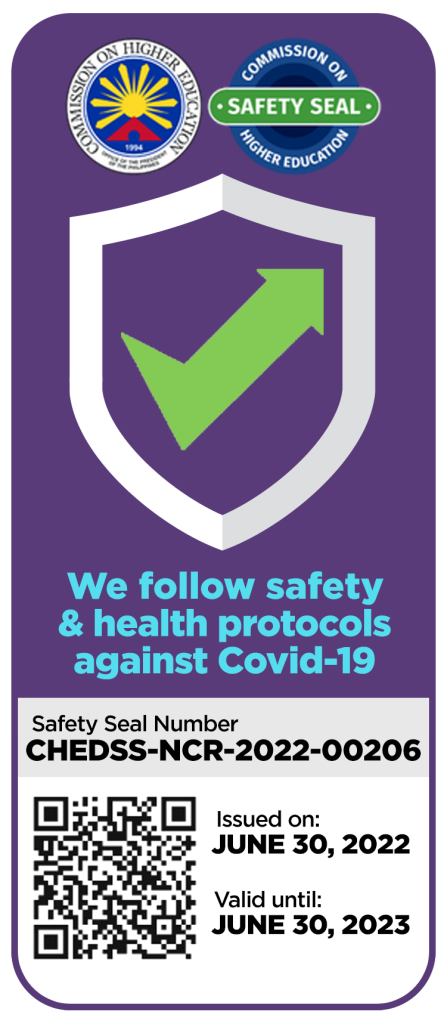
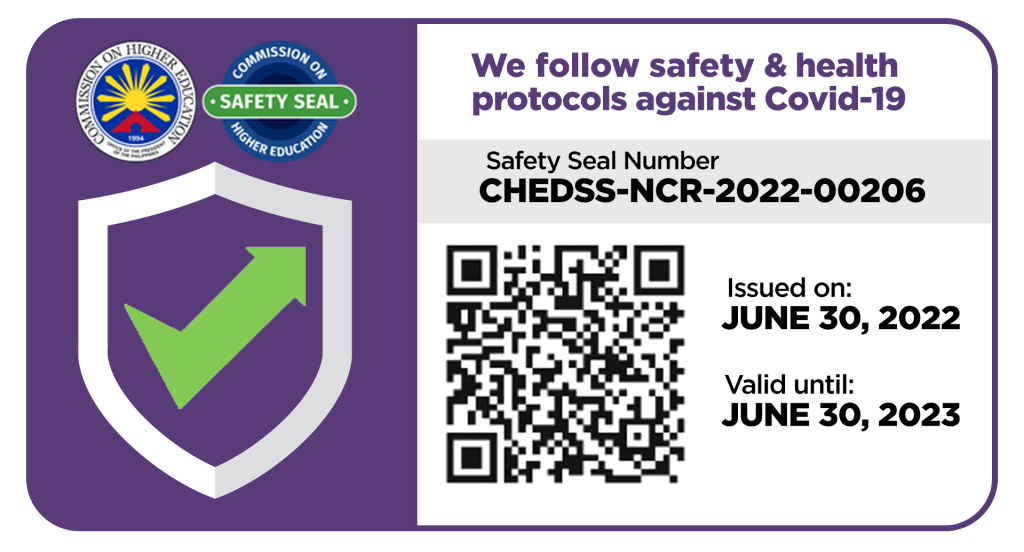




Bachelor of Science in Biology is a four-year program that provides its students the opportunity to integrate, interpret, and translate biological phenomena through scientific observations and environmental observations, and use this information to make meaningful decisions, with emphasis on its applications in the environment, medical field, and the industry.
The BS Biology program has three majors / specializations: (1) Medical Biology, (2) Industrial Biology, and (3) Environmental Biology.
The Medical Biology curriculum provides a firm foundation in biology, with focus on human anatomy and physiology, histology and histopathology, medical microbiology, parasitology, and immunology.
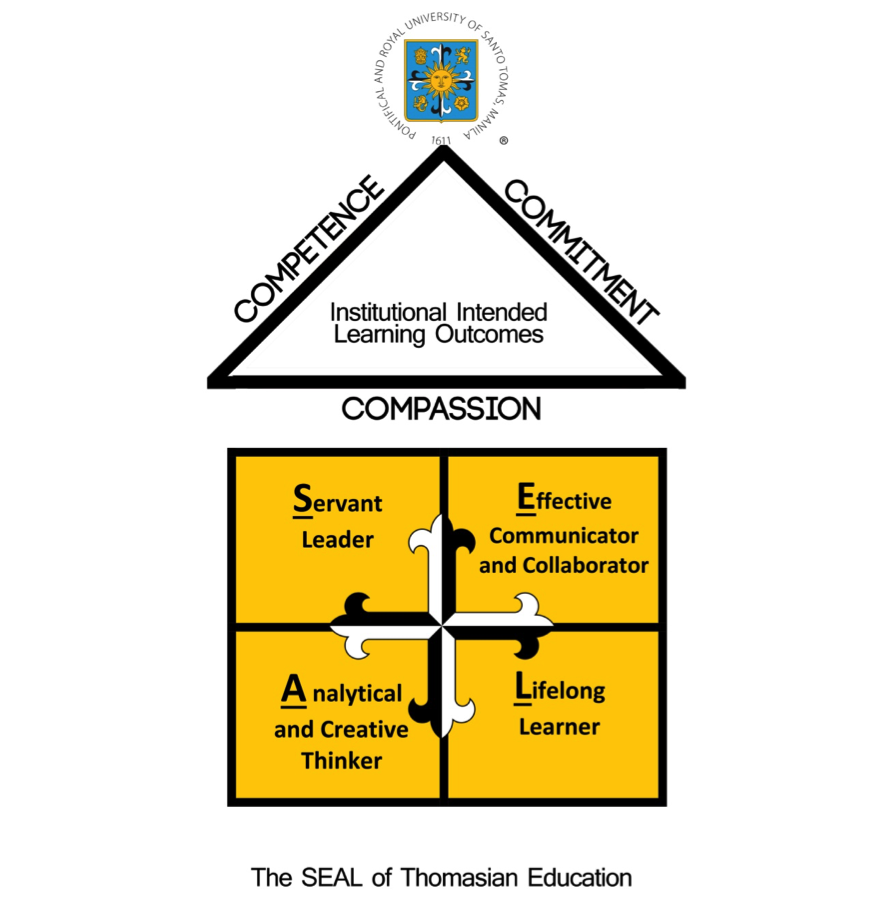
The University of Santo Tomas, in pursuit of truth, guided by reason and illumined by faith, dedicates herself to the generation, advancement, and transmission of knowledge to form competent and compassionate professionals committed to the service of the Church, the nation, and the global community.
I am a Thomasian. I carry the SEAL of Thomasian education. I am a Servant leader, an Effective communicator and collaborator, an Analytical and creative thinker, and a Lifelong learner. With Christ at the center of my formation as a Thomasian, I am expected to demonstrate the following Thomasian Graduate Attributes (ThoGAs):
SERVANT LEADER
EFFECTIVE COMMUNICATOR AND COLLABORATOR
ANALYTICAL AND CREATIVE THINKER
LIFELONG LEARNER
Graduate attributes are generic capabilities that ideally all graduates should possess by the end of their university learning experience, regardless of their field of specialization. These have been identified as being valued in a field of study, and are important considerations in the preparation of materials for learning and teaching.
A graduate of the College of Science is:
Application Period: July to December of each year
Release of Results: January 28 of the following year
Go to THIS PAGE and look for the “College of Science” tab for the tuition fees.
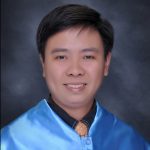
Dear Freshmen Thomasian Scientists,
I would like to extend my warmest virtual welcome to the UST College of Science to all of you!
Never in recent history has science played such a visible role in society. This highlights the country’s need for more scientists to continue the task of discovering and understanding the world we live in, and in innovating technologies and processes to solve humanity’s most pressing concerns. Thomasian scientists have always played a significant role in charting the scientific progress of this country. By choosing the UST College of Science, you have already shown a desire to be part of this country’s scientific workforce. Our motto in the College of Science is “Galing Science, Galing Science!”. This speaks of our desire to instill excellence among our students, which we hope you will all embody by the time you earn your degrees.
This is a truly unprecedented start to Academic Year 2020-2021 for all of us. Rest assured that the College of Science is one with the entire UST community in ensuring that learning will take place for our students despite these challenging circumstances. The learning management system of the university, dubbed the UST Cloud Campus, which has been in place for more than a decade now, is ready to provide the main platform for the efficient delivery of instruction. However, given the distinct challenges posed by the COVID-19 pandemic, our faculty are continuously innovating to meet the demands of this uncharted territory in higher education. We will also strive to provide adequate laboratory instruction, which is central to the sciences, despite the limitations set forth by physical distancing and public health regulations.
We hope to develop a strong partnership with you, our dear students, your parents, guardians, benefactors and families, in order to ensure that you get the quality Thomasian science education you sought to have by enrolling in our college.
We all pray that in due time, we can continue to deliver the quality Thomasian science education you deserve under more normal circumstances.
Prof. Rey Donne S. Papa, PhD
Dean
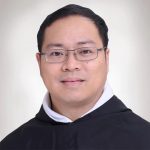
In this extraordinary time of the COVID-19 pandemic, the role of Faith and Science becomes greatly underscored in our life. Welcoming you to the University of Santo Tomás, therefore, does not only bring joy but hope for the people of God whom you will be serving.
In the face of physical, economic, psychological, and spiritual predicaments, we must be undeterred to pursue the Veritas (Truth) through our academic endeavors per scientiam ad Dominum (through Science towards the Lord) as inspired by our patron St. Albert the Great, and his illustrious disciple, St. Thomas Aquinas, who said: “Just as it is better to illuminate than merely to shine, so to pass on what one has contemplated is better than merely to contemplate” (cf. S.Th. II-II q. 188 a. 6.).
Through Faith and Science, we keep on finding courage in the midst of life’s hardship. When life is difficult, all the more that we need to be full of life. The harder the blow, the harder we hope. Illuminate others than merely shine. Share the fruits of your studies, than merely contemplate. Don’t be discouraged over closed doors; look for the back door and even the open windows. Don’t just focus on what we’ve lost; look also for what we’ve received. Welcome to the UST College of Science.
Rev. Fr. Louie R. Coronel, O.P., EHL
Regent
Common to the BS Biology Program
Specialization-specific
The University of Santo Tomas provides student services that cater to academic, spiritual, and wellness concerns of students. These support units are found in the different parts of the campus and can be accessed by Thomasians. When the University shifted to distance learning, the services also transitioned to online services to continue addressing the needs of Thomasians.
Effectivity: A.Y. 2021-2022
This curriculum may have some changes upon the availability of new guidelines.
Year | First Term (August – December) | Second Term (January – May) | Special Term (June – July) |
1 | / | / | none |
2 | / | / | none |
3 | / | / | none |
4 | / | / | none |
First Term
Abbreviation | Description | Lec. Hrs. | Lab. Hrs. | Units | Pre-Requisites | Co-Requisites |
BIO 421 | General Botany | 3 | 0 | 3 | ||
BIO 421L | General Botany (Laboratory) | 0 | 2 | 2 | BIO 421 | |
BIO 422 | General Zoology | 3 | 0 | 3 | ||
BIO 422L | General Zoology (Laboratory) | 0 | 2 | 2 | BIO 422 | |
FIL 1 | Panimulang Pagsasalin | 3 | 0 | 3 | ||
NSTP 1 | National Service Training Program 1 | 0 | 3 | 3 | ||
PATH-FIT | Physical Activities Towards Health and Fitness in Sports | 2 | 0 | 2 | ||
THY 1 | Christian Vision of the Human Person | 3 | 0 | 3 | ||
UND_SELF | Understanding the Self | 3 | 0 | 3 | ||
TOTAL | 17 | 7 | 24 |
Second Term
Abbreviation | Description | Lec. Hrs. | Lab. Hrs. | Units | Co-Requisites | Co-Requisites |
BIO 423 | Systematics | 3 | 0 | 3 | BIO 421, BIO 421L, BIO 422, BIO 422L | |
BIO 423L | Systematics (Laboratory) | 0 | 2 | 2 | BIO 421, BIO 421L, BIO 422, BIO 422L | BIO 423 |
BIO 424 | Statistical Biology | 2 | 1 | 3 | ||
CHEM 401 | Chemical Biology 1 – Organic Molecules | 3 | 0 | 3 | ||
CHEM 401L | Chemical Biology 1 – Organic Molecules (Laboratory) | 0 | 2 | 2 | CHEM 401 | |
GE ELEC I | Elective I | 3 | 0 | 3 | ||
NSTP 2 | National Service Training Program 2 | 0 | 3 | 3 | NSTP 1 | |
PATH-FIT | Physical Activities Towards Health and Fitness in Dance | 2 | 0 | 2 | ||
PURPCOM | Purposive Communication | 3 | 0 | 3 | ||
THY 2 | Christian Vision of Marriage and Family | 3 | 0 | 3 | THY 1 | |
TOTAL | 19 | 8 | 27 |
First Term
Abbreviation | Description | Lec. Hrs. | Lab. Hrs. | Units | Pre-Requisites | Co-Requisites |
BIO 425 | Microbiology | 3 | 0 | 3 | BIO 425L | |
BIO 425L | Microbiology (Laboratory) | 0 | 2 | 2 | BIO 425 | |
BIO 426 | General Ecology | 3 | 0 | 3 | BIO 424 | BIO 426L |
BIO 426L | General Ecology (Laboratory) | 0 | 2 | 2 | BIO 424 | BIO 426 |
CHEM 402 | Chemical Biology 2 – Analytical Methods | 3 | 0 | 3 | ||
CHEM 402L | Chemical Biology 2 – Analytical Methods (Laboratory) | 0 | 2 | 2 | ||
PATH-FIT | Fitness Exercises for Specific Sports | 2 | 0 | 2 | ||
READ_PH | Readings in Philippine History | 3 | 0 | 3 | ||
THY 3 | Christian Vision of the Church in Society | 3 | 0 | 3 | THY 1, THY 2 | |
TOTAL | 17 | 6 | 23 |
Second Term
Abbreviation | Description | Lec. Hrs. | Lab. Hrs. | Units | Pre-Requisites | Co-Requisites |
BIO 427 | Evolutionary Biology | 3 | 0 | 3 | BIO 423, BIO 423L | BIO 427L |
BIO 427L | Evolutionary Biology (Laboratory) | 0 | 2 | 2 | BIO 423, BIO 423L | BIO 427 |
BIO 428 | Genetics | 3 | 0 | 3 | BIO 421, BIO 421L, BIO 422, BIO 422L, BIO 425, BIO 425L | BIO 428L |
BIO 428L | Genetics (Laboratory) | 0 | 2 | 2 | BIO 421, BIO 421L, BIO 422, BIO 422L, BIO 425, BIO 425L | BIO 428 |
CHEM 403 | Chemical Biology 3 – Biomolecules | 3 | 0 | 3 | ||
CHEM 403L | Chemical Biology 3 – Biomolecules (Laboratory) | 0 | 2 | 2 | ||
GE ELEC II | Elective II | 3 | 0 | 3 | ||
MATH_MW | Mathematics in the Modern World | 3 | 0 | 3 | ||
PATH-FIT | Human Enhancement | 2 | 0 | 2 | ||
THY 4 | Living the Christian Vision in the Contemporary World | 3 | 0 | 3 | THY 1, THY 2, THY 3 | |
TOTAL | 20 | 6 | 26 |
First Term
Abbreviation | Description | Lec. Hrs. | Lab. Hrs. | Units | Pre-Requisites | Co-Requisites |
BIO 4212 | Cell and Molecular Biology | 3 | 0 | 3 | BIO 421, BIO 421L, BIO 422, BIO 422L, BIO 425, BIO 425L, CHEM 403, CHEM 403L | BIO 4212L |
BIO 4212L | Cell and Molecular Biology (Laboratory) | 3 | 0 | 3 | BIO 421, BIO 421L, BIO 422, BIO 422L, BIO 425, BIO 425L, CHEM 403, CHEM 403L | BIO 4212 |
CONTEM_W | The Contemporary World | 3 | 0 | 3 | ||
LIWORIZ | Life and Works of Rizal | 0 | 2 | 2 | ||
SCI 409 | Biophysics | 2 | 0 | 2 | SCI 409L | |
SCI 409L | Biophysics (Laboratory) | 0 | 2 | 2 | SCI 409 | |
STS | Science, Technology and Society | 3 | 0 | 3 | ||
TOTAL | 14 | 4 | 18 |
Second Term
Abbreviation | Description | Lec. Hrs. | Lab. Hrs. | Units | Pre-Requisites | Co-Requisites |
BIO 4210 | Physiology | 3 | 0 | 3 | BIO 421, BIO 421L, BIO 422, BIO 422L, CHEM 403, CHEM 403L, SCI 409, SCI 409L | BIO 4210L |
BIO 4210L | Physiology (Laboratory) | 0 | 2 | 2 | BIO 421, BIO 421L, BIO 422, BIO 422L, CHEM 403, CHEM 403L, SCI 409, SCI 409L | BIO 4210 |
BIO 4211 | Developmental Biology | 3 | 0 | 3 | BIO 427, BIO 427L, BIO 428, BIO 428L | BIO 4211L |
BIO 4211L | Developmental Biology (Laboratory) | 0 | 2 | 2 | BIO 427, BIO 427L, BIO 428, BIO 428L | BIO 4211 |
BIO 4121 | Medical Parasitology | 1 | 0 | 1 | BIO 422, BIO 422L | BIO 4121L |
BIO 4121L | Medical Parasitology (Laboratory) | 0 | 1 | 1 | BIO 422, BIO 422L | BIO 4121 |
CHM 4116 | Biochemistry 2 Lec | 3 | 0 | 3 | CHEM403, CHEM403L | |
SCI 403 | Research 1 | 2 | 0 | 2 | BIO 421, BIO 421L, BIO 422, BIO 422L, BIO 425, BIO 425L | |
SCI 404 | Practicum | 0 | 3 | 3 | ||
TOTAL | 12 | 8 | 20 |
First Term
Abbreviation | Description | Lec. Hrs. | Lab. Hrs. | Units | Pre-Requisites | Co-Requisites |
ART_APP | Art Appreciation | 3 | 0 | 3 | ||
BIO 4122 | Human Anatomy and Physiology | 3 | 0 | 3 | BIO 4210 | BIO 4122L |
BIO 4122L | Human Anatomy and Physiology (Laboratory) | 0 | 2 | 2 | BIO 4210 | BIO 4122 |
BIO 4123 | Histology and Histopathology | 3 | 0 | 3 | BIO 422, BIO 422L, BIO 425, BIO 425L | BIO 4123L |
BIO 4123L | Histology and Histopathology (Laboratory) | 0 | 2 | 2 | BIO 422, BIO 422L, BIO 425, BIO 425L | BIO 4123 |
ELE 1 | Professional Elective 1 | 3 | 0 | 3 | ||
SCI 405 | Research 2 | 0 | 2 | 2 | SCI 203 | |
TOTAL | 12 | 6 | 18 |
Second Term
Abbreviation | Description | Lec. Hrs. | Lab. Hrs. | Units | Pre-Requisites | Co-Requisites |
BIO 4213 | Medical Microbiology | 3 | 0 | 3 | BIO 425, BIO 425L | |
BIO 4213L | Medical Microbiology (Laboratory) | 0 | 2 | 2 | BIO 425, BIO 425L | BIO 4213 |
BIO 4214 | Immunology | 3 | 0 | 3 | BIO 4212, BIO 4212L | |
BIO 4124 | Molecular Medicine | 2 | 0 | 2 | BIO 4212, BIO 4212L, BIO 428, BIO 428L | |
ELE 2 | Professional Elective 2 | 3 | 0 | 3 | ||
ETHICS | Ethics | 3 | 0 | 3 | ||
GE ELEC III | Elective III | 3 | 0 | 3 | ||
SCI 406 | Research 3 | 0 | 2 | 2 | BIO 424, SCI 405 | |
TOTAL | 17 | 4 | 21 |
Effectivity: A.Y. 2019-2020
This curriculum may have some changes upon the availability of new guidelines.
Year | First Term (August – December) | Second Term (January – May) | Special Term (June – July) |
1 | / | / | none |
2 | / | / | none |
3 | / | / | none |
4 | / | / | none |
First Term
Abbreviation |
Description |
Lec. Hrs. |
Lab. Hrs. |
Units |
Pre-Requisites |
Co-Requisites |
BIO 421 |
General Botany |
3 |
0 |
3 |
||
BIO 421L |
General Botany (Laboratory) |
0 |
2 |
2 |
BIO 421 |
|
BIO 422 |
General Zoology |
3 |
0 |
3 |
||
BIO 422L |
General Zoology (Laboratory) |
0 |
2 |
2 |
BIO 422 |
|
FIL 1 |
Kontekstuwalisadong Komunikasyon sa Filipino |
3 |
0 |
3 |
||
NSTP 1 |
National Service Training Program 1 |
0 |
3 |
3 |
||
PATH-FIT |
Physical Activities Towards Health and Fitness in Sports |
2 |
0 |
2 |
||
THY 1 |
Christian Vision of the Human Person |
3 |
0 |
3 |
||
UND_SELF |
Understanding the Self |
3 |
0 |
3 |
||
TOTAL |
17 |
7 |
24 |
Second Term
Abbreviation |
Description |
Lec. Hrs. |
Lab. Hrs. |
Units |
Co-Requisites |
Co-Requisites |
BIO 423 |
Systematics |
3 |
0 |
3 |
BIO 421, BIO 421L, BIO 422, BIO 422L |
|
BIO 423L |
Systematics (Laboratory) |
0 |
2 |
2 |
BIO 421, BIO 421L, BIO 422, BIO 422L |
BIO 423 |
BIO 424 |
Statistical Biology |
2 |
1 |
3 |
||
CHEM 401 |
Chemical Biology 1 – Organic Molecules |
3 |
0 |
3 |
||
CHEM 401L |
Chemical Biology 1 – Organic Molecules (Laboratory) |
0 |
2 |
2 |
CHEM 401 |
|
FIL 2 |
Panimulang Pagsasalin |
3 |
0 |
3 |
FIL 1 |
|
NSTP 2 |
National Service Training Program 2 |
0 |
3 |
3 |
NSTP 1 |
|
PATH-FIT |
Physical Activities Towards Health and Fitness in Dance |
2 |
0 |
2 |
||
PURPCOM |
Purposive Communication |
3 |
0 |
3 |
||
THY 2 |
Christian Vision of Marriage and Family |
3 |
0 |
3 |
THY 1 |
|
TOTAL |
19 |
8 |
27 |
First Term
Abbreviation | Description | Lec. Hrs. | Lab. Hrs. | Units | Pre-Requisites | Co-Requisites |
BIO 425 | Microbiology | 3 | 0 | 3 | ||
BIO 425L | Microbiology (Laboratory) | 0 | 2 | 2 | BIO 425 | |
BIO 426 | General Ecology | 3 | 0 | 3 | BIO 424 | |
BIO 426L | General Ecology (Laboratory) | 0 | 2 | 2 | BIO 424 | BIO 426 |
CHEM 402 | Chemical Biology 2 – Analytical Methods | 3 | 0 | 3 | ||
CHEM 402L | Chemical Biology 2 – Analytical Methods (Laboratory) | 0 | 2 | 2 | CHEM 402 | |
PATH-FIT | Fitness Exercises for Specific Sports | 2 | 0 | 2 | ||
READ_PH | Readings in Philippine History | 3 | 0 | 3 | ||
THY 3 | Christian Vision of the Church in Society | 3 | 0 | 3 | THY 1, THY 2 | |
TOTAL | 17 | 6 | 23 |
Second Term
Abbreviation | Description | Lec. Hrs. | Lab. Hrs. | Units | Pre-Requisites | Co-Requisites |
BIO 427 | Evolutionary Biology | 3 | 0 | 3 | BIO 423, BIO 423L | |
BIO 427L | Evolutionary Biology (Laboratory) | 0 | 2 | 2 | BIO 423, BIO 423L | BIO 427 |
BIO 428 | Genetics | 3 | 0 | 3 | BIO 421, BIO 421L, BIO 422, BIO 422L, BIO 425, BIO 425L | |
BIO 428L | Genetics (Laboratory) | 0 | 2 | 2 | BIO 421, BIO 421L, BIO 422, BIO 422L, BIO 425, BIO 425L | BIO 428 |
CHEM 403 | Chemical Biology 3 – Biomolecules | 3 | 0 | 3 | ||
CHEM 403L | Chemical Biology 3 – Biomolecules (Laboratory) | 0 | 2 | 2 | CHEM 403 | |
LIT 1 | The Great Works | 3 | 0 | 3 | ||
MATH_MW | Mathematics in the Modern World | 3 | 0 | 3 | ||
PATH-FIT | Human Enhancement | 2 | 0 | 2 | ||
THY 4 | Living the Christian Vision in the Contemporary World | 3 | 0 | 3 | THY 1, THY 2, THY 3 | |
TOTAL | 20 | 6 | 26 |
First Term
Abbreviation | Description | Lec. Hrs. | Lab. Hrs. | Units | Pre-Requisites | Co-Requisites |
BIO 4212 | Cell and Molecular Biology | 3 | 0 | 3 | BIO 421, BIO 421L, BIO 422, BIO 422L, BIO 425, BIO 425L, CHEM 403, CHEM 403L | |
BIO 4212L | Cell and Molecular Biology (Laboratory) | 3 | 0 | 3 | BIO 421, BIO 421L, BIO 422, BIO 422L, BIO 425, BIO 425L, CHEM 403, CHEM 403L | BIO 4212 |
CONTEM_W | The Contemporary World | 3 | 0 | 3 | ||
LIWORIZ | Life and Works of Rizal | 0 | 2 | 2 | ||
SCI 409 | Biophysics | 2 | 0 | 2 | ||
SCI 409L | Biophysics (Laboratory) | 0 | 2 | 2 | SCI 409 | |
STS | Science, Technology and Society | 3 | 0 | 3 | ||
TOTAL | 14 | 4 | 18 |
Second Term
Abbreviation | Description | Lec. Hrs. | Lab. Hrs. | Units | Pre-Requisites | Co-Requisites |
BIO 4210 | Physiology | 3 | 0 | 3 | BIO 421, BIO 421L, BIO 422, BIO 422L, CHEM 403, CHEM 403L, SCI 409, SCI 409L | |
BIO 4210L | Physiology (Laboratory) | 0 | 2 | 2 | BIO 421, BIO 421L, BIO 422, BIO 422L, CHEM 403, CHEM 403L, SCI 409, SCI 409L | BIO 4210 |
BIO 4211 | Developmental Biology | 3 | 0 | 3 | BIO 427, BIO 427L, BIO 428, BIO 428L | |
BIO 4211L | Developmental Biology (Laboratory) | 0 | 2 | 2 | BIO 427, BIO 427L, BIO 428, BIO 428L | BIO 4211 |
BIO 4121 | Medical Parasitology | 1 | 0 | 1 | BIO 422, BIO 422L | |
BIO 4121L | Medical Parasitology (Laboratory) | 0 | 1 | 1 | BIO 422, BIO 422L | BIO 4121 |
CHM 4116 | Biochemistry 2 Lec | 3 | 0 | 3 | CHEM403, CHEM403L | |
SCI 403 | Research 1 | 2 | 0 | 2 | BIO 421, BIO 421L, BIO 422, BIO 422L, BIO 425, BIO 425L | |
SCI 404 | Practicum | 0 | 3 | 3 | ||
TOTAL | 12 | 8 | 20 |
First Term
Abbreviation | Description | Lec. Hrs. | Lab. Hrs. | Units | Pre-Requisites | Co-Requisites |
ART_APP | Art Appreciation | 3 | 0 | 3 | ||
BIO 4122 | Human Anatomy and Physiology | 3 | 0 | 3 | BIO 4210 | |
BIO 4122L | Human Anatomy and Physiology (Laboratory) | 0 | 2 | 2 | BIO 4210 | BIO 4122 |
BIO 4123 | Histology and Histopathology | 3 | 0 | 3 | BIO 422, BIO 422L, BIO 425, BIO 425L | |
BIO 4123L | Histology and Histopathology (Laboratory) | 0 | 2 | 2 | BIO 422, BIO 422L, BIO 425, BIO 425L | BIO 4123 |
ELE 1 | Professional Elective 1 | 3 | 0 | 3 | ||
SCI 405 | Research 2 | 0 | 2 | 2 | SCI 203 | |
TOTAL | 12 | 6 | 18 |
Second Term
Abbreviation | Description | Lec. Hrs. | Lab. Hrs. | Units | Pre-Requisites | Co-Requisites |
BIO 4213 | Medical Microbiology | 3 | 0 | 3 | BIO 425, BIO 425L | |
BIO 4213L | Medical Microbiology (Laboratory) | 0 | 2 | 2 | BIO 425, BIO 425L | BIO 4213 |
BIO 4214 | Immunology | 3 | 0 | 3 | BIO 4212, BIO 4212L | |
BIO 4124 | Molecular Medicine | 2 | 0 | 2 | BIO 4212, BIO 4212L, BIO 428, BIO 428L | |
ELE 2 | Professional Elective 2 | 3 | 0 | 3 | ||
ETHICS | Ethics | 3 | 0 | 3 | ||
GE ELEC I | Elective I | 3 | 0 | 3 | ||
SCI 406 | Research 3 | 0 | 2 | 2 | BIO 424, SCI 405 | |
TOTAL | 17 | 4 | 21 |
Effectivity: A.Y. 2018-2019
This curriculum may have some changes upon the availability of new guidelines.
Year | First Term (August – December) | Second Term (January – May) | Special Term (June – July) |
1 | / | / | none |
2 | / | / | none |
3 | / | / | none |
4 | / | / | none |
First Term
Abbreviation | Description | Lec. Hrs. | Lab. Hrs. | Units | Pre-Requisites | Co-Requisites |
BIO 421 | General Botany | 3 | 0 | 3 | ||
BIO 421L | General Botany (Laboratory) | 0 | 2 | 2 | BIO 421 | |
BIO 422 | General Zoology | 3 | 0 | 3 | ||
BIO 422L | General Zoology (Laboratory) | 0 | 2 | 2 | BIO 422 | |
FIL 1 | Kontekstuwalisadong Komunikasyon sa Filipino | 3 | 0 | 3 | ||
MATH_MW | Mathematics in the Modern World | 3 | 0 | 3 | ||
NSTP 1 | National Service Training Program 1 | 0 | 3 | 3 | ||
PATH-FIT | Physical Activities Towards Health and Fitness in Sports | 2 | 0 | 2 | ||
THY 1 | Christian Vision of the Human Person | 3 | 0 | 3 | ||
UND_SELF | Understanding the Self | 3 | 0 | 3 | ||
TOTAL | 20 | 7 | 27 |
Second Term
Abbreviation | Description | Lec. Hrs. | Lab. Hrs. | Units | Co-Requisites | Co-Requisites |
BIO 423 | Systematics | 3 | 0 | 3 | BIO 421, BIO 421L, BIO 422, BIO 422L | |
BIO 423L | Systematics (Laboratory) | 0 | 2 | 2 | BIO 421, BIO 421L, BIO 422, BIO 422L | BIO 423 |
BIO 424 | Statistical Biology | 2 | 1 | 3 | ||
CHEM 401 | Chemical Biology 1 – Organic Molecules | 3 | 0 | 3 | ||
CHEM 401L | Chemical Biology 1 – Organic Molecules (Laboratory) | 0 | 2 | 2 | CHEM 401 | |
FIL 2 | Panimulang Pagsasalin | 3 | 0 | 3 | FIL 1 | |
NSTP 2 | National Service Training Program 2 | 0 | 3 | 3 | NSTP 1 | |
PATH-FIT | Physical Activities Towards Health and Fitness in Dance | 2 | 0 | 2 | ||
PURPCOM | Purposive Communication | 3 | 0 | 3 | ||
THY 2 | Christian Vision of Marriage and Family | 3 | 0 | 3 | THY 1 | |
TOTAL | 19 | 8 | 27 |
First Term
Abbreviation | Description | Lec. Hrs. | Lab. Hrs. | Units | Pre-Requisites | Co-Requisites |
BIO 425 | Microbiology | 3 | 0 | 3 | ||
BIO 425L | Microbiology (Laboratory) | 0 | 2 | 2 | BIO 425 | |
BIO 426 | General Ecology | 3 | 0 | 3 | BIO 424 | |
BIO 426L | General Ecology (Laboratory) | 0 | 2 | 2 | BIO 424 | BIO 426 |
CHEM 402 | Chemical Biology 2 – Analytical Methods | 3 | 0 | 3 | ||
CHEM 402L | Chemical Biology 2 – Analytical Methods (Laboratory) | 0 | 2 | 2 | CHEM 402 | |
PATH-FIT | Fitness Exercises for Specific Sports | 2 | 0 | 2 | ||
READ_PH | Readings in Philippine History | 3 | 0 | 3 | ||
THY 3 | Christian Vision of the Church in Society | 3 | 0 | 3 | THY 1, THY 2 | |
TOTAL | 17 | 6 | 23 |
Second Term
Abbreviation | Description | Lec. Hrs. | Lab. Hrs. | Units | Pre-Requisites | Co-Requisites |
BIO 427 | Evolutionary Biology | 3 | 0 | 3 | BIO 423, BIO 423L | |
BIO 427L | Evolutionary Biology (Laboratory) | 0 | 2 | 2 | BIO 423, BIO 423L | BIO 427 |
BIO 428 | Genetics | 3 | 0 | 3 | BIO 421, BIO 421L, BIO 422, BIO 422L, BIO 425, BIO 425L | |
BIO 428L | Genetics (Laboratory) | 0 | 2 | 2 | BIO 421, BIO 421L, BIO 422, BIO 422L, BIO 425, BIO 425L | BIO 428 |
CHEM 403 | Chemical Biology 3 – Biomolecules | 3 | 0 | 3 | ||
CHEM 403L | Chemical Biology 3 – Biomolecules (Laboratory) | 0 | 2 | 2 | CHEM 403 | |
LIT 1 | The Great Works | 3 | 0 | 3 | ||
PATH-FIT | Human Enhancement | 2 | 0 | 2 | ||
THY 4 | Living the Christian Vision in the Contemporary World | 3 | 0 | 3 | THY 1, THY 2, THY 3 | |
TOTAL | 17 | 6 | 23 |
First Term
Abbreviation | Description | Lec. Hrs. | Lab. Hrs. | Units | Pre-Requisites | Co-Requisites |
BIO 4212 | Cell and Molecular Biology | 3 | 0 | 3 | BIO 421, BIO 421L, BIO 422, BIO 422L, BIO 425, BIO 425L, CHEM 403, CHEM 403L | |
BIO 4212L | Cell and Molecular Biology (Laboratory) | 3 | 0 | 3 | BIO 421, BIO 421L, BIO 422, BIO 422L, BIO 425, BIO 425L, CHEM 403, CHEM 403L | BIO 4212 |
CONTEM_W | The Contemporary World | 3 | 0 | 3 | ||
LIWORIZ | Life and Works of Rizal | 0 | 2 | 2 | ||
SCI 409 | Biophysics | 2 | 0 | 2 | ||
SCI 409L | Biophysics (Laboratory) | 0 | 2 | 2 | ||
STS | Science, Technology and Society | 3 | 0 | 3 | ||
TOTAL | 14 | 4 | 18 |
Second Term
Abbreviation | Description | Lec. Hrs. | Lab. Hrs. | Units | Pre-Requisites | Co-Requisites |
BIO 4210 | Physiology | 3 | 0 | 3 | BIO 421, BIO 421L, BIO 422, BIO 422L, CHEM 403, CHEM 403L, SCI 409, SCI 409L | |
BIO 4210L | Physiology (Laboratory) | 0 | 2 | 2 | BIO 421, BIO 421L, BIO 422, BIO 422L, CHEM 403, CHEM 403L, SCI 409, SCI 409L | BIO 4210 |
BIO 4211 | Developmental Biology | 3 | 0 | 3 | BIO 427, BIO 427L, BIO 428, BIO 428L | |
BIO 4211L | Developmental Biology (Laboratory) | 0 | 2 | 2 | BIO 427, BIO 427L, BIO 428, BIO 428L | BIO 4211 |
BIO 4121 | Medical Parasitology | 1 | 0 | 1 | BIO 422, BIO 422L | |
BIO 4121L | Medical Parasitology (Laboratory) | 0 | 1 | 1 | BIO 422, BIO 422L | BIO 4121 |
CHM 4116 | Biochemistry 2 Lec | 3 | 0 | 3 | CHEM403, CHEM403L | |
SCI 403 | Research 1 | 2 | 0 | 2 | BIO 421, BIO 421L, BIO 422, BIO 422L, BIO 425, BIO 425L | |
SCI 404 | Practicum | 0 | 3 | 3 | ||
TOTAL | 12 | 8 | 20 |
First Term
Abbreviation | Description | Lec. Hrs. | Lab. Hrs. | Units | Pre-Requisites | Co-Requisites |
ART_APP | Art Appreciation | 3 | 0 | 3 | ||
BIO 4122 | Human Anatomy and Physiology | 3 | 0 | 3 | BIO 4210 | |
BIO 4122L | Human Anatomy and Physiology (Laboratory) | 0 | 2 | 2 | BIO 4210 | |
BIO 4123 | Histology and Histopathology | 3 | 0 | 3 | BIO 422, BIO 422L, BIO 425, BIO 425L | |
BIO 4123L | Histology and Histopathology (Laboratory) | 0 | 2 | 2 | BIO 422, BIO 422L, BIO 425, BIO 425L | BIO 4123 |
ELE 1 | Professional Elective 1 | 3 | 0 | 3 | ||
SCI 405 | Research 2 | 0 | 2 | 2 | SCI 203 | |
TOTAL | 12 | 6 | 18 |
Second Term
Abbreviation | Description | Lec. Hrs. | Lab. Hrs. | Units | Pre-Requisites | Co-Requisites |
BIO 4213 | Medical Microbiology | 3 | 0 | 3 | BIO 425, BIO 425L | |
BIO 4213L | Medical Microbiology (Laboratory) | 0 | 2 | 2 | BIO 425, BIO 425L | BIO 4213 |
BIO 4214 | Immunology | 3 | 0 | 3 | BIO 4212, BIO 4212L | |
BIO 4124 | Molecular Medicine | 2 | 0 | 2 | BIO 4212, BIO 4212L, BIO 428, BIO 428L | |
ELE 2 | Professional Elective 2 | 3 | 0 | 3 | ||
ETHICS | Ethics | 3 | 0 | 3 | ||
GE ELEC I | Elective I | 3 | 0 | 3 | ||
SCI 406 | Research 3 | 0 | 2 | 2 | BIO 424, SCI 405 | |
TOTAL | 17 | 4 | 21 |
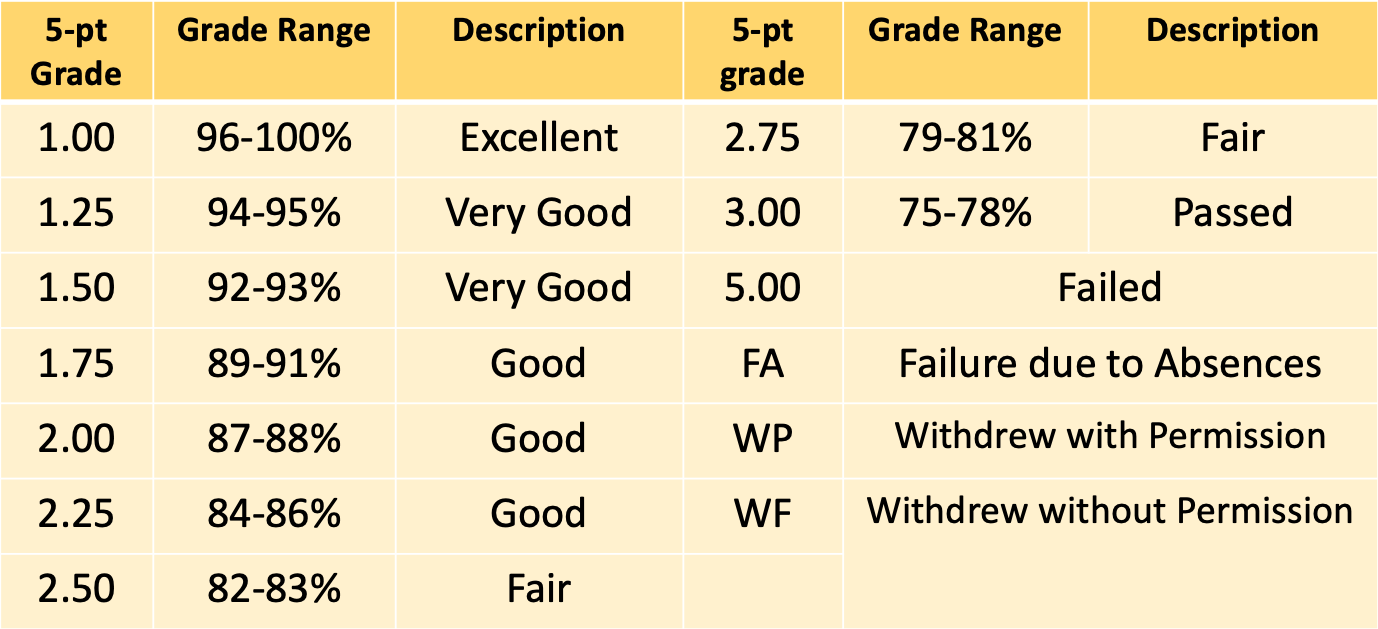
( + )/2
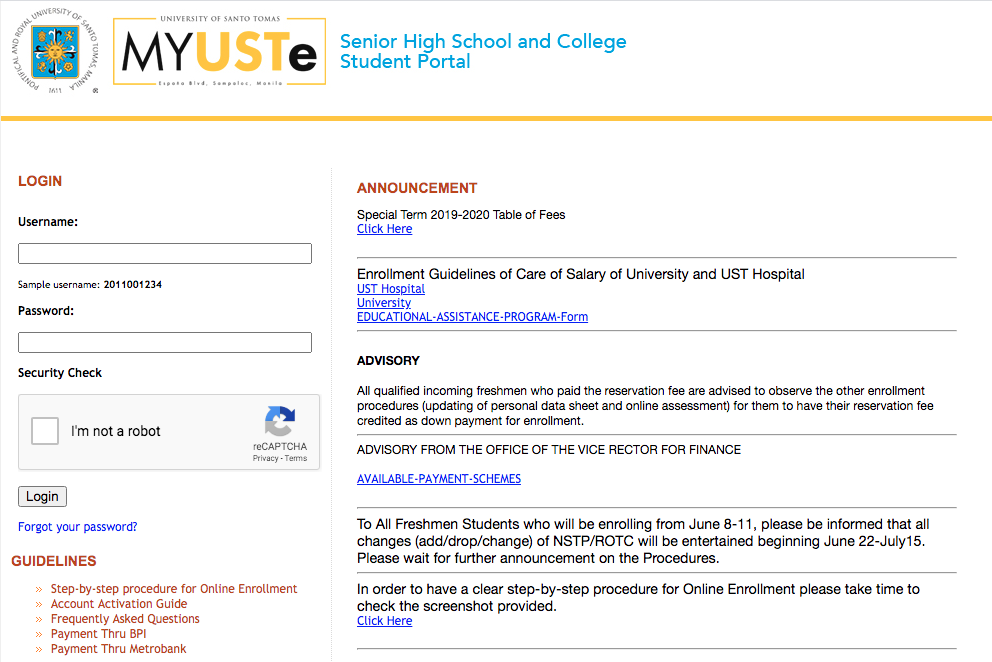
The average raw grade is transmuted to the 5-point grade equivalent. A sample matrix of computation based on 60-raw grade passing mark is shown:
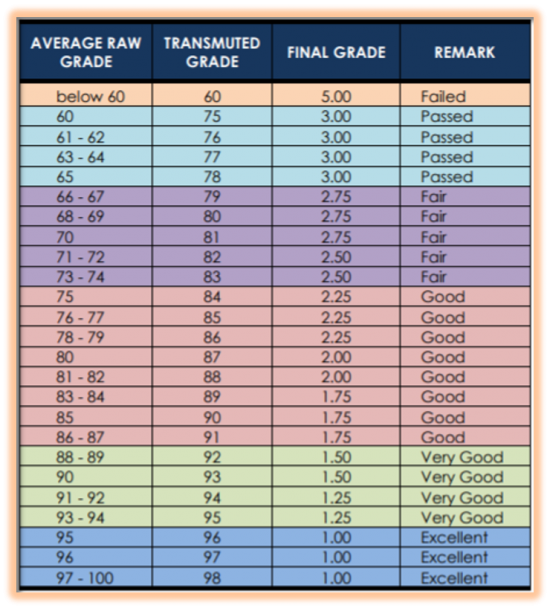
Lecture and their corresponding laboratory courses are known as Co-Requisites.
Lecture Courses
For most technical courses, the passing raw grade is 60.
| Class Standing | 60% |
| Preliminary / Final Exams | 30% |
| Course Inquiry Project (CIP) | 10% |
Course Inquiry Project
Laboratory Courses
| Class Standing | 70% |
| Preliminary / Final Exams | 30% |
Regular: No deficiencies and taking the regular load
Irregular: With back subjects and/or with uncleared deficiencies (5.0, WF, FA, INC)
The College of Science is the second home to her students. The college looks after not only the students’ academic progress but also their personal development and well-being.
The following are certain policies and guidelines on student welfare and development set by the College of Science and the Office for Student Affairs.
Based on PPS No. 1027: Code of Conduct
The University of Santo Tomas is the second home of the Thomasian students. Its task is mainly to form and improve the students’ character, attitude and moral values, as well as to develop their intellectual, physical and psychological fitness. A proper norm of conduct is designed to inculcate these ideals.
The University, through its Counseling and Career Center, aim to help learners achieve holistic student development and success.
Counseling and Case Management
Career Services
Imposition of disciplinary action is progressive. As such, the following list shows the levels of disciplinary action.
Offenses punishable by non-readmission, exclusion, or expulsion

The University of Santo Tomas is one of the leading private research universities in the Philippines and is consistently ranked among the top 1000 universities in the whole world. With academic degrees and research thrusts in the natural, health, applied, social, and sacred sciences, as well as business and management, the University continuously strives to make a positive impact on the society.
Visit Us:
Espana Blvd., Sampaloc, Manila, Philippines 1008

© Copyright 2019. University of Santo Tomas. All Rights reserved. | Powered by Communications Bureau